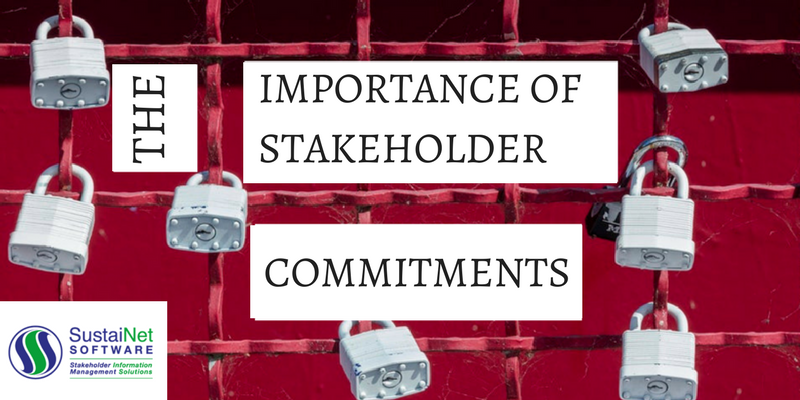
Making, tracking and keeping commitments is recognized as one of the most important aspects of stakeholder relationship management.
But, it is also one of the most difficult responsibilities to track and adjust over the lifespan of a complex initiative. In addition, commitments are often legally enforceable within the scope of a project and are a pivotal factor that can make or break its success.
Building trust when working on a complex, multi-stakeholder initiative is hard work – and that equity erodes quickly when a promise is broken.
Types of stakeholder commitments
A commitment is a promise made to people directly or indirectly affected by your project. It involves an organization agreeing to do or not to do something important to stakeholders.
Commitments can:
- Be related to regulatory or environmental compliance.
- Be single tasks such as building a fence, or a recurring action such as testing well water on a set schedule over a period of time.
- Be promises attached to assets i.e. a pipeline on a farm.
- Be linked to geographical areas of cultural significance.
- Be multi-stepped in nature, that must be tracked prior to being completed.
- Be promises that can achieve the goals and needs of a business
- Be part of a company’s reputation in their field
- Involve the safekeeping of confidential information
What happens when stakeholder commitments are broken?
Despite best intentions, important commitments can be overlooked, especially in an atmosphere of constant change. Promises are broken when commitments are lost due to people coming and going on a project, lack of recording, and lack of communication.
In the end, when commitments are broken an organization’s reputation can suffer, and projects have a much higher likelihood of getting delayed or cancelled.
The importance of a win-win commitment
While you need stakeholder confirmation of your projects, it is important to note that all parties must walk out of a project with a win. A win-win mentality will not only keep your company’s record in good health, but you’ll also generate positive reviews from stakeholders you’ve worked with. Your company will therefore have an easier time working with stakeholders for projects, and may be able to get more on board.
Effective management of commitments is a strategic necessity.
To create trust, demonstrate transparency, and achieve the best results, organizations must do a number of things.
- Make solid commitments that are measurable and achievable
- Continuously communicate and update all groups affected over the course of a project
- Track communications in a detailed and time-based manner
- Keep good records of project milestones and impactful events
- Keep promises made to stakeholders
Using technology to keep commitments and achieve success
Dedicated stakeholder management solutions like StakeTracker help organizations stay on track with their commitments by centrally managing all communications regarding the impact their initiatives have on the communities in which they operate.
In addition to easing the burden and risk associated with manual tracking commitments, StakeTracker records stakeholder issues, interests, and concerns as well as manages the assignment of tasks and generation of project reports that help organizations demonstrate commitments have been met.
StakeTracker also ensures that all communications related to a commitment are archived. As a result, there is a consistent, historic digital record of what has transpired regarding promises to stakeholders even if team members or stakeholder representatives change over time.

Leave a Reply